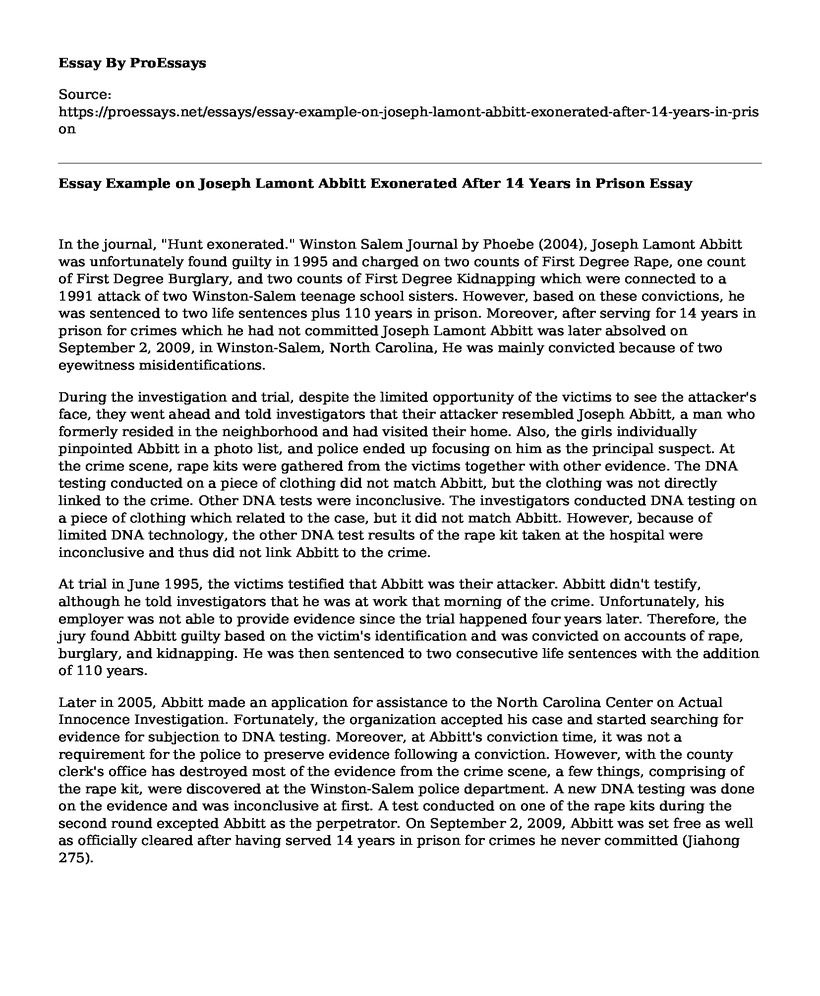In the journal, "Hunt exonerated." Winston Salem Journal by Phoebe (2004), Joseph Lamont Abbitt was unfortunately found guilty in 1995 and charged on two counts of First Degree Rape, one count of First Degree Burglary, and two counts of First Degree Kidnapping which were connected to a 1991 attack of two Winston-Salem teenage school sisters. However, based on these convictions, he was sentenced to two life sentences plus 110 years in prison. Moreover, after serving for 14 years in prison for crimes which he had not committed Joseph Lamont Abbitt was later absolved on September 2, 2009, in Winston-Salem, North Carolina, He was mainly convicted because of two eyewitness misidentifications.
During the investigation and trial, despite the limited opportunity of the victims to see the attacker's face, they went ahead and told investigators that their attacker resembled Joseph Abbitt, a man who formerly resided in the neighborhood and had visited their home. Also, the girls individually pinpointed Abbitt in a photo list, and police ended up focusing on him as the principal suspect. At the crime scene, rape kits were gathered from the victims together with other evidence. The DNA testing conducted on a piece of clothing did not match Abbitt, but the clothing was not directly linked to the crime. Other DNA tests were inconclusive. The investigators conducted DNA testing on a piece of clothing which related to the case, but it did not match Abbitt. However, because of limited DNA technology, the other DNA test results of the rape kit taken at the hospital were inconclusive and thus did not link Abbitt to the crime.
At trial in June 1995, the victims testified that Abbitt was their attacker. Abbitt didn't testify, although he told investigators that he was at work that morning of the crime. Unfortunately, his employer was not able to provide evidence since the trial happened four years later. Therefore, the jury found Abbitt guilty based on the victim's identification and was convicted on accounts of rape, burglary, and kidnapping. He was then sentenced to two consecutive life sentences with the addition of 110 years.
Later in 2005, Abbitt made an application for assistance to the North Carolina Center on Actual Innocence Investigation. Fortunately, the organization accepted his case and started searching for evidence for subjection to DNA testing. Moreover, at Abbitt's conviction time, it was not a requirement for the police to preserve evidence following a conviction. However, with the county clerk's office has destroyed most of the evidence from the crime scene, a few things, comprising of the rape kit, were discovered at the Winston-Salem police department. A new DNA testing was done on the evidence and was inconclusive at first. A test conducted on one of the rape kits during the second round excepted Abbitt as the perpetrator. On September 2, 2009, Abbitt was set free as well as officially cleared after having served 14 years in prison for crimes he never committed (Jiahong 275).
Conclusion
In conclusion, globally, it is good for law enforcement agencies to always embrace learning from the past errors of other investigators and stop misidentifying suspects to avoid convicting innocent persons, which is unfair.
Works Cited
He, Jiahong. "The Proof of Wrongful Convictions." The methodology of Judicial Proof and Presumption. Springer, Singapore, 2018. 261-278.
Zerwick, Phoebe. "Hunt exonerated." Winston Salem Journal (2004).
Cite this page
Essay Example on Joseph Lamont Abbitt Exonerated After 14 Years in Prison. (2023, Apr 09). Retrieved from https://proessays.net/essays/essay-example-on-joseph-lamont-abbitt-exonerated-after-14-years-in-prison
If you are the original author of this essay and no longer wish to have it published on the ProEssays website, please click below to request its removal:
- Women Finally Speak: Oprah's Speech Analysis
- Causes of Illegal Immigration Essay
- Paper Example on Juvenile vs. Adult Justice System
- DHS Homeland Security Intelligence Center Essay Example
- Research Paper on Childhood and Criminal Activity
- Essay Example on U.S. Strengthens Global Partnerships to Enhance Self-Defence
- Essay Example on Murder Investigation at 123 Harriet Avenue, Key West







